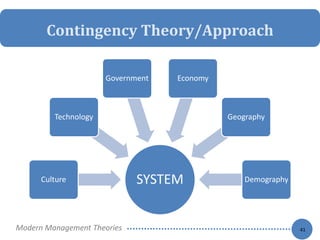Types of Modern Management Theories

Modern management theories encompass a diverse range of perspectives and approaches that help guide organizational practices. Here are some key types of modern management theories:
-
Systems Theory:
- Overview: Views organizations as complex systems with interconnected and interdependent components.
- Key Concepts: Emphasizes the interactions and relationships between different parts of an organization, encouraging a holistic approach to management.
-
Contingency Theory:
- Overview: Posits that there is no one-size-fits-all management approach, and the most effective style depends on the specific circumstances.
- Key Concepts: Encourages flexibility in management practices to adapt to different situations and contexts.
-
Human Relations Theory:
- Overview: Focuses on the impact of social and psychological factors on employee motivation and productivity.
- Key Concepts: Highlights the importance of positive interpersonal relationships, employee satisfaction, and group dynamics.
-
Behavioral Management Theory:
- Overview: Examines individual and group behaviors within organizations to understand and influence them.
- Key Concepts: Emphasizes leadership styles, motivation, and group dynamics as determinants of employee behavior.
-
Quantitative Management Theory:
- Overview: Utilizes mathematical models and statistical methods for decision-making and problem-solving.
- Key Concepts: Involves operations research, management science, and other quantitative approaches to optimize processes and resource allocation.
-
Contemporary Management Theories:
- Overview: Encompasses various recent theories and frameworks that address the dynamic nature of the business environment.
- Key Concepts: Includes Total Quality Management (TQM), Lean Management, Six Sigma, Agile Management, and other approaches focused on continuous improvement, efficiency, and adaptability.
-
Strategic Management Theory:
- Overview: Concerned with the formulation and execution of organizational strategies to achieve long-term goals and gain a competitive advantage.
- Key Concepts: Involves strategic planning, environmental analysis, resource allocation, and the alignment of organizational resources with strategic objectives.
-
Knowledge Management Theory:
- Overview: Focuses on the creation, sharing, and application of knowledge within an organization to enhance innovation and competitive advantage.
- Key Concepts: Emphasizes the importance of managing intellectual capital and fostering a learning culture.
-
Ethical Management Theory:
- Overview: Integrates ethical considerations into organizational decision-making and behavior.
- Key Concepts: Addresses ethical leadership, corporate social responsibility, and sustainability.
These types of modern management theories are not mutually exclusive, and organizations often adopt a combination of these approaches based on their specific needs and the context in which they operate. Successful management typically involves integrating various theories to create a comprehensive and effective management framework.
Thank you.
